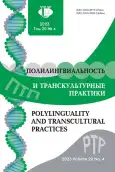Translingual Theory: Steven Kellman’s Studies
- Authors: Ovcherenko U.V.1, Tokareva N.A.1
-
Affiliations:
- RUDN University
- Issue: Vol 20, No 4 (2023)
- Pages: 684-693
- Section: Literary Dimension
- URL: https://journal-vniispk.ru/2618-897X/article/view/326672
- DOI: https://doi.org/10.22363/2618-897X-2023-20-4-684-693
- EDN: https://elibrary.ru/LZCCFG
- ID: 326672
Cite item
Full Text
Abstract
In the modern world under the conditions of globalization, interest in the phenomenon of transcultural text is steadily increasing. Familiar terms of monoculture become irrelevant for describing modern cultural phenomena, in this connection we found that the term “bilingual” is insufficient, not fully reflecting the essence of the processes occurring in the writer’s thinking and literary text. We concluded that the term “translingual” is the most preferable and succinct. It includes the notion of a mutually enriching dialog of cultures, not just a nominal distinction of languages. The study of various approaches to the research of the process of transculturation, which is most vividly reflected in translingual literature, is conditioned by the need to expand the paradigm from which the literary bi-, poly- and translingual experience of the Russian-speaking world is to be considered. This unique phenomenon cannot be studied only within the framework of the narratives of the new age that has established itself in Europe, or exclusively in the logic of European modernity. If we set a task to find scientific works on transculturalism or translingual literature in Russian, we will encounter a negligible number of them. However, the reason for this will not be the lack of researchers’ interest in the subject of study, but it will be due to a difference in wording. The fact is that the term “transcultural literature” has not yet taken root on the territory of, for example, the post-Soviet space: the term “bilingual” literature is more often used to designate the subject of study. That is why in this article we will first outline the boundaries and define the essence of the research: we will consider the term “bilingualism”, its types, the relevance of this concept in the modern world in general and in the post-Soviet space in particular, compare it with the term “transculturality”, etc.; then we will prove why the term “translingual” has certain and obvious advantages over the term “bilingual”, and after that we will turn to the figure of Stephen Kellman as an apologist of the theory of transcultural literature. Within the framework of this paper we will analyze some of the scientific works of Russian-speaking researchers who write articles, monographs devoted to this topic.
About the authors
Uliana V. Ovcherenko
RUDN University
Author for correspondence.
Email: ovcherenko-u@rudn.ru
ORCID iD: 0009-0004-8706-6906
Candidate of Philological Sciences, teacher of the Department of Russian Language and Intercultural Communication, Institute of Russian Language
6 Mikhlukho-Maklaya str., Moscow, 117198, Russian FederationNadezhda A. Tokareva
RUDN University
Email: tokareva_nadia@mail.ru
ORCID iD: 0000-0002-2437-5670
Postgraduate student of the Department of Russian Language and Intercultural Communication, Institute of Russian Language
6 Mikhlukho-Maklaya str., Moscow, 117198, Russian FederationReferences
- Oparina, E.O. 2018. “Interaction of language in contemporary world: Political and cultural characteristics of bilingualism on the “post-Soviet” space”. Human Being: Image and Essence. Humanitarian Aspects 1–2 (32–33): 48–60. Print. (In Russ.).
- Tuksaitova, R.O. 2007. “Bilingual situation in modern Kazakhstan”. Russian Language Abroad 1: 97–101. Print. (In Russ.).
- Ortiz, F. 1995. “Cuban Counterpoint: Tobacco and Sugar”. Durham. Print. (In Eng.).
- Tlostanova, M.V. 2011. “Transculturation as a model of sociocultural dynamics and the problem of multiple identification”. Questions of Social Theory V: 126–149. Print. (In Russ.).
- Tlostanova, M.V. 2004. “Post-Soviet literature and the aesthetics of transculturation. To live never, to write from nowhere”. Moscow: Editorial URSS publ. Print. (In Russ.).
- Novokhatskiy, D. 2019. “Transcultural Text and Russian Literature Mainstream Tendencies: Tashkent Roman by Suhbat Aflatuni”. Mundo Eslavo 18: 74–91. Print. (In Russ.).
- Valikova, J.A., Demchenko, A.S. 2020. “Translingual Literary Text: On Problem of Understanding”. Polylinguality and Transcultural Practices 17 (3): 352–362. Print. (In Russ.). https://doi.org/10.22363/2618-897X-2020-17-3-352-362
- Gerasimova, I.A., Ivakhnov, V.Yu. 2017. “The problem of preservation of cultural identity in conditions of globalization”. Servis plus 11 (2): 66–76. Print. (In Russ.). https://doi.org/10.22412/1993-7768-11-2-9.
- Valuitseva, I.I., Khukhuni, G.Т. 2015. “Literary bilingualism: pro and contra”. Polylinguality and Transcultural Practices 5: 298–303. Print. (In Russ.).
- Bakhtikireeva, O.M. 2005. “Creative bilingualism and the works of fictionʼs peculiarities of bilingual writers”. Dissertation of the Doctor of Philological Sciences: 10.02.01. Moscow. Print. (In Russ.).
- Sultanov, К.К. 2016. “Russian-language literature as a cultural phenomenon and object of research”. Stephanos 3: 154–162 (In Russ.).
- Gabunia, Z.M. 2006. “Artistic Russian-language text as a mediator of two languages and two cultures”. Cuandernos de Rusistica Espanola 2: 104–115. Print. (In Russ.).
- Kellman, S.G. 2020. “Nimble Tongues: Studies in Literary Translingualism”. Purdue University Press Book Previews. Print. (In Eng.).
- Kellman, S.G. 2019. “Literary Translingualism: What and Why?”. Polylinguality and Transcultural Practices 16 (3): 337–346. Print.
Supplementary files









